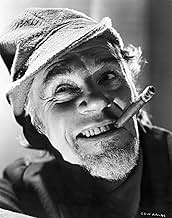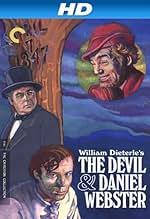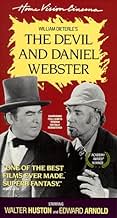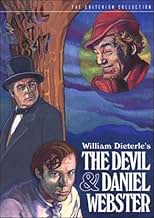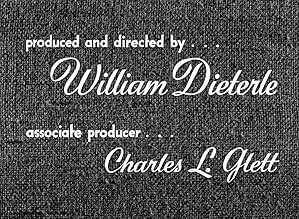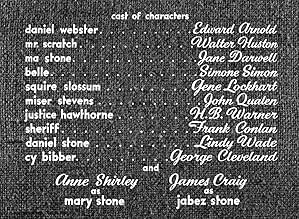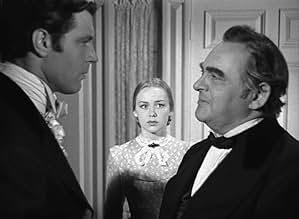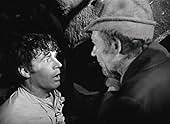En el siglo XIX, un granjero de New Hampshire hace un pacto con Satanás para conseguir el éxito económico, y luego recurre al famoso orador Daniel Webster para que lo libere de su contrato.En el siglo XIX, un granjero de New Hampshire hace un pacto con Satanás para conseguir el éxito económico, y luego recurre al famoso orador Daniel Webster para que lo libere de su contrato.En el siglo XIX, un granjero de New Hampshire hace un pacto con Satanás para conseguir el éxito económico, y luego recurre al famoso orador Daniel Webster para que lo libere de su contrato.
- Dirección
- Guión
- Reparto principal
- Ganó 1 premio Óscar
- 2 premios y 1 nominación en total
- Spectator
- (sin acreditar)
- Hank
- (sin acreditar)
- Poker Player
- (sin acreditar)
- Woman
- (sin acreditar)
- Martin Van Buren Aldrich
- (sin acreditar)
Reseñas destacadas
One word - "fantasy". It's my favorite movie category, and this is the best one that I've ever seen. The 1940s was the decade in which horror melodramas and fantasies really began to ramp up, and this movie helped to set the standard. Stephen Vincent Benet's story is a bit changed, but not enough to diminish this American Gothic tale.
Aside from being superior entertainment, the movie simply has no weaknesses. Where to start? The casting and acting are extraordinary. Though both are most often remembered for other movies, Edward Arnold and Walter Huston turn in their best performances here. Simone Simon (known today for the "Cat People" movies) is exceptional as Belle. Anne Shirley, James Craig, and the stellar supporting cast are also great.
This is Bernard Herrmann's best film score. William Dieterle's direction is quirky and involving, propelling the film along at a fast clip. Admittably, the characters are caricatures, but Dieterle helps us to feel their trials and tribulations. The movie also features brilliant cinematography, exceptional production values, and truly superior editing (this was an early job for director Robert Wise). The scenes are quite stagey, but never disjointed - the logic of the story is unmistakable and riveting.
Huston is the ultimate "Mr. Scratch". I've seen this show many times, and it's a 10/10.
This classic fantasy based upon the legend of Faust is adapted from the story by Stephen Vincent Benet. The movie is very persuasively made , usually rise to a crescendo of emotion.Entertaining fantasy is visually striking with Walter Huston in a rare and successful comic role as sympathetic Devil. Film contains marvelous performances by main cast and secondaries actors such as Gene Lockhart, John Qualen,HB Warner,Jane Darnwell Simone Simon as a witch ad Jeff Corey appears uncredited.This cult fantasy drama is a sometimes uneven, but throughly funny and amusing recounting of the Faustian tale.
This delicate fantasy about a farmer who gradually realizes that has been deceived by the Devil has very evocative black-and white cinematography by Joseph August, Dieterle's usual and he photographed 'Portrait of Jennie'.The film won Oscars 1941 for original dramatic score by Bernard Herrmann. The motion picture is well directed by William Dieterle as a classic example of drama/comedy/fantasy of the 40s. Dieterle is a German director who was in Hollywood by 1930s and directing dramas(Scarlet down,Fog over Frisco,Fashions), costumer(Hunchback of Notre Dame,Kismet,Omar Khayyan) and biopics experts(Life of Emile Zola,Dr Ehrlich, Juarez, Madame Curie,Reuter) that were a revelation at the box-office.
**** stars outta ****, do see it.
Funny: Huston as ol' Mr. Scratch was SO good. Very funny, cynical wit. Lots of little things that stand out from him, all the odd places he turns up. He's everywhere, leading the band at the parade for Dan'l, in Washington whispering in the senator's ear, playing a mean fiddle at the barn dance. His insults to Jabez Stone were priceless. The bit at the end of him ravenously devouring this huge pie was a really funny demonstration of his greed, and the final moments of examining his book for the next target are priceless.
Creepy: Between all the funny stuff were the implications of hell and damnation, but especially terror and hopelessness (Stone and Miser Stevens). The visitors at Stone's new mansion really creeped me out good. Also creepy was the infamous scene where Miser Stevens recently harvested soul comes flying out of Scratch's jacket pocket screaming for help. This also counts as funny, at least when my five year old nephew and I go around effecting high-pitched squeals begging "Help me Neighbor Stone."
Sexy: Belle, the French nanny/whore that Scratch sent Jabez was hotter with her clothes on and no direct sexual behavior than the hookers making out in the elevator to entertain Al Pacino in "The Devil's Advocate." Note the exact tone and body language of her mocking rebuff to Stone at the barn dance saying "Oh, NO Mr. Stone- your place is with your WIFE."
The hottest thing in the movie (and one of the creepiest things) is the scene where she is singing some evil otherworldly lullaby to Stone's infant son. Rewind and watch it closely a couple of times. What was she singing?
Surely this is one of the greatest forgotten movies of the era. This should be making some of those AFI top 100 list thingeys.
What seemed startling in 1941 feels mostly creaky by today's standards, but there are still some fresh moments of film making in this one. William Dieterle was obviously open to experimentation when it comes to the use of cinematography and sound, and the movie has a striking visual look. The plot is mostly connect the dots, and there are no real surprises, but I don't know that one watches a morality tale for surprises in the first place.
Walter Huston is extremely creepy as the Devil (aka Mr. Scratch). He received a Best Actor Academy Award nomination for his performance even though, based on sheer screen time, he really has more of a supporting role. But he's so effective when on screen that his presence dominates the film even when he's physically absent, which probably accounts for the lead nomination.
Edward Arnold is pretty good too as Daniel Webster. Also standing out is Jane Darwell (Ma Joad in "The Grapes of Wrath") as a hardened farm mother.
Parts of this film have a wicked sense of humour, which I thoroughly enjoyed. The trial at the end (with a literal jury of the damned), is especially amusing.
On a sidenote, the film was successful in capturing the 1941 Academy Award for Best Dramatic Score.
Don't expect to see any points made that haven't already been made a thousand times in a thousand other movies, but enjoy the originality of the film technique on display.
Grade: A-
¿Sabías que...?
- CuriosidadesWilliam Dieterle had a habit of directing with white gloves on. Robert Wise said that everyone thought it was because he had a germ or dirt phobia. During shooting of one scene, Dieterle noticed there wasn't enough mud on a carriage wheel. He pulled off his gloves, grabbed some mud, rubbed it onto the wheel, then wiped his hands on his pants and put the gloves back on to continue directing.
- PifiasShortly after filming had begun, Thomas Mitchell fractured his skull and was replaced by Edward Arnold. Not many scenes had been shot, none were reshot, so Mitchell is still visible in some scenes. [Note: entries in the Trivia section indicate that all of Mitchell's scenes were reshot.]
- Citas
Mr. Scratch: You shall have your trial, Mr. Webster. But I'm sure you'll agree, this is hardly the case for an ordinary jury.
Daniel Webster: Let it be the quick or the dead, so long as it is an American judge and an American jury!
Mr. Scratch: 'The quick or the dead!' You have said it.
[he stomps on the barn floor; a door opens]
Mr. Scratch: You must pardon the leathery toughness of one or two.
Jabez Stone: [afraid] Mr. Webster!
[a line of ghosts begin entering from the trapdoor]
Mr. Scratch: Captain Kidd - he killed men for gold. Simon Girty, the renegade - he burned men for gold. Governor Dale - he broke men on the wheel. Asa, the Black Monk - he choked them to death. Floyd Ireson and Stede Bonnet, the fiendish butchers. Walter Butler, King of the Massacre. Big and Little Harp, robbers and murderers. Teach, the Cutthroat. Morton, the vicious lawyer... and General Benedict Arnold. You remember him, no doubt.
Daniel Webster: A jury of the damned...
Mr. Scratch: [laughs] Dastards, liars, traitors, knaves. Your suggestion, Mr. Webster - 'the quick or the dead.'
Daniel Webster: This is outrageous, I asked for a fair trial...
Mr. Scratch: Americans, all.
- Créditos adicionalesFor some prints released under the title "The Devil and Daniel Webster", the opening credits start with the phrase "in front of the camera..." followed by a list of names only of the primary cast (no character names) and then the phrase "in back of the camera..." followed by a list of names only of the primary production crew, without their job roles, ending with the phase "all collaborated on the picture...." Then the title card is shown, with a story credit to Stephen Vincent Benet, and the note "this picture was originally shown with the title 'all that money can buy'." The title card is all in lower case. Finally, the opening prologue is shown as noted in another crazy credit item.
- Versiones alternativasOver the years, this film was re-released more than once, partly because of its poor box office, and gradually cut down to 85 minutes. It remained in this form for many years, until it was recently restored to its full length. When this was done in the 1990s, it was unfortunately all too easy to tell which sections are restored... all the footage from the 85 minute version was in absolutely pristine, mint condition, while the long-lost, formerly missing footage has less than perfect sound and picture quality. However, the quality has been considerably improved on the DVD and on recent TV showings.
- Banda sonoraCome, Ye Thankful People, Come
(uncredited)
Music by George J. Elvey
Lyrics by Henry Alford
Selecciones populares
- How long is The Devil and Daniel Webster?Con tecnología de Alexa
Detalles
- Fecha de lanzamiento
- País de origen
- Idioma
- Títulos en diferentes países
- Un pacto con el diablo
- Localizaciones del rodaje
- Empresa productora
- Ver más compañías en los créditos en IMDbPro
- Duración
- 1h 47min(107 min)
- Color
- Relación de aspecto
- 1.37 : 1


